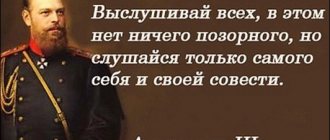". This is how it always turns out: a person thinks to himself – I’m doing a good job! Grab - and people are unhappy" (Luke)
***
". People are becoming smarter, more and more interesting, and even though they live, they get worse and worse, but they want to get better and better, stubborn. "
***
". It is, perhaps, lordship - like smallpox, a person will recover, but the signs remain. "
***
". Children especially need to be respected! Children need space! Don’t interfere with the children’s lives. Respect the children. "(Satin reports Luke's words)
***
". Human! It's great! It sounds proud! Human! We must respect the person! It is necessary not to feel sorry, not to humiliate him with pity. "(Satin about a person)
***
". It turns out: no matter how you paint yourself on the outside, everything will be erased, everything will be erased, yes. "(Bubnov)
***
". In a woman there must be a soul. We are animals, we need to be taught. "(Vaska Ash)
***
". Work if you like, so what is there to be proud of? If you value people at work, then a horse carries you better than any person and remains silent. "
***
". Education is nonsense, the main thing is talent. And talent is faith in yourself, in your strength” (Actor)
***
". Crooks - I know all the smart ones! They are crazy - impossible. A good person, even a stupid person, is good, but a bad person must have intelligence. "(Medvedev)
Aphorisms and quotes from the heroes of A. M. Gorky’s play “At the Depths”
". This is how it always turns out: a person thinks to himself – I’m doing a good job! Grab - and people are unhappy"
***
- ". People are becoming smarter, more and more interesting, and even though they live, they get worse and worse, but they want to get better and better, stubborn. " ". It is, perhaps, lordship - like smallpox, a person will recover, but the signs remain. "
***
". There are so many different people on earth who rule over each other and instill all sorts of fears in each other, but there is still no order in life and no purity.”
***
". A person lives every way as his heart is adjusted, so he lives today – good, tomorrow – evil.”
***
". It is necessary, girl, someone needs to be kind and feel sorry for people! It’s good to feel sorry for a person in time. "
***
- ". Prison will not teach you goodness, and Siberia will not teach you, but man will teach you! A person can teach goodness very simply. "
***
". It’s true, it’s not always that a person’s illness can’t always cure a soul with truth.”
***
". That is why every person must be respected, because we do not know who he is, why he was born and what he can do, he was born for our happiness for our great benefit. "
***
". Children especially need to be respected! Children need space! Don’t interfere with the children’s lives. Respect the children. "
***
“I respect swindlers too, in my opinion, not a single flea is bad: they’re all black, they all jump. so that"
***
"AND. what do you really need badly? think about it! She really might be a bitch for you. "
***
- "Ash:. God exists? Luke: If you believe there is; don't believe me no. What you believe in is what it is. "
***
“Man lives in different ways. as the heart is adjusted, so it lives. today good, tomorrow evil. "
***
“Prison won’t teach you goodness, and Siberia won’t teach you, but people will teach you, yes! A person can teach goodness very simply!”
***
“A person lives every way as his heart is adjusted, so he lives today - good, tomorrow - evil”
***
“Heal yourself! Nowadays they are treating for drunkenness, listen!, brother, they are treating such a hospital for drunkards, so that they can be treated for nothing. They have recognized, you see, that a drunkard is also a person.”
***
- “This is how it always turns out: a person thinks to himself - I’m doing a good job! Grab it, but people are unhappy"
***
“I have papers, but they are no good. They are all good for nothing.
***
“We are all wanderers on earth. They say, I heard, that our earth is also a wanderer in the sky.”
***
“We lived better, yes! I used to wake up in the morning and, lying in bed, drink coffee with cream, yes!”
***
“Ehehe! I’ll look at you, brothers, your life is oh! Such a life that you get up in the morning and howl.”
- “I’m tired, brother, of all human words. All our words are tired! I heard every one of them. probably a thousand times. "
***
“Man, this is the truth! Everything is in man, everything is for man! Only man exists, everything else is the work of his hands and his brain! Human! It's great! It sounds. proudly!"
***
“Those who are weak in soul... and who live on other people’s juices need a lie... some are supported by it, others hide behind it. "
***
"Was. (Grinsing.) There are very good books. and many interesting words. I was an educated person. You know?"
“What happened, but only trifles remained. There are no gentlemen here. Everything was gone, only one naked man remained. "
***
- "Hmm yeah. And here I am. I can't lie! For what? In my opinion, leave the whole truth as it is! Why be ashamed?
***
- My head is buzzing! And why do people hit each other on the head? - They are not only on the head, but throughout the rest of the body
***
“So, just for consideration, it turns out: no matter how you paint yourself on the outside, everything will be erased, everything will be erased, yes!”
Bubnov's indifferent cynicism
What is Bubnov’s way of thinking and views? He is convinced that all people are “chips” and are powerless to resist the flow of life. In life, everything is decided by circumstances that influence the fate of each person. Guided by this logic, Bubnov does nothing to change anything in his destiny, and yet he is only 45! He has come to terms with his situation and considers the shelter his home.
Believing in the inevitability of human troubles and misfortunes, Bubnov considers attempts to fight fate ridiculous and useless. He is absolutely convinced of his melancholy and delivers any remark calmly and without emotion. This rather speaks not of confidence, but of complete indifference to what is happening.
When Anna, who is on her deathbed, asks not to make noise, Bubnov replies with complete indifference that their noise will not prevent her from dying. This episode reveals another feature of this “hero” - cynicism towards people and their suffering.
Did not you find what you were looking for?
Just write and we will help
The death of Anna, a thirty-year-old woman who had seen nothing but poverty and abuse in her life, became an indicative event: Luka will sigh with compassion, Natasha will respond with pain and pity, the bitterness of regret shines through in the words of the Actor; and only Bubnov’s phrases will be empty and indifferent, like his soul, like himself.
At Nastya, inspired by the long-past love of a young student, Bubnov and Baron laugh and mock rudely, considering both her feelings and love itself a fiction.
Compassion does not knock on Bubnov’s soul. He doesn't understand the lies Luke is talking about. To lie for the sake of profit or your own good - yes, but to lie for the sake of supporting another person, for the sake of healing his soul - this is “fiction”, this cannot be.
Quotes from the play “At the Lower Depths” (Maxim Gorky)
And the good side is Siberia! Golden side! He who has strength and intelligence is like a cucumber in a greenhouse!
Luke's words in a conversation with the thief Ash (act 2).
Nobility is like smallpox... and a person will recover, but the signs remain...
Luke's words about the Baron (impoverished gentleman) (act 1).
You can't go anywhere in the carriage of the past
Satin's words addressed to the impoverished master Baron, who remembered how he used to live richly (act 4).
There are people everywhere... At first you don’t see it... then you look, it turns out they’re all people... nothing!
The words of the locksmith Kleshch about the inhabitants of the shelter, whom he at first despised, and then got used to them (act 4).
What you believe in is what it is...
Luke's words in a conversation with the thief Ash (act 2).
Everyone wants order, but there is a lack of reason
Bubnov's words from a conversation about the hostess of the shelter Vasilisa (act 1).
Every person wants his neighbor to have a conscience, but, you see, it’s not beneficial for anyone to have one
Satin's words about conscience. From a conversation between Ash and Bubnov with Kleshch about Satin and conscience (act 1).
People live for something better
The words of the wanderer Luke, which Satin remembered in a conversation with the inhabitants of the shelter (act 4).
If you value people based on their work... then a horse is better than any person... it carries you and is silent!
Words from the thief Ash about the locksmith Kleshche (act 3).
Expect some sense from the wolf!
The words of the thief Ash in a conversation with policeman Medvedev (act 2).
Crooks are all smart... I know! They are crazy - impossible. A good person, even a stupid person, is good, but a bad person must have intelligence.
Words of policeman Medvedev about swindlers and people (act 4).
And why do they separate people when they fight? They themselves would have stopped... because you get tired of fighting...
Words of policeman Medvedev (action 1).
When work is pleasure, life is good! When work is a duty, life is slavery!
Satin's words about labor (act 1).
Lies are the religion of slaves and masters... Truth is the god of a free man!
Words of Satin, from a conversation about the wanderer Luke (act 4).
It’s not the word that matters, but why the word is said
Luke's words about Nastya's story about her past love, which the inhabitants of the shelter did not believe (act 3).
Prison will not teach you goodness, and Siberia will not teach you... but man will...
Luke's words, after his story about the thieves who broke into the house (act 3).
All people have gray souls... everyone wants to brown up...
Bubnov’s words after Nastya’s story about her past love, which the inhabitants of the shelter did not believe (act 3).
A person can do anything... if only he wants...
Luke's words in conversation with the Actor (act 2).
A person must respect himself...
Luke's words in a conversation with Ash and Natasha (act 3).
Man - that sounds proud
Words of Satin from the so-called Monologue of Satin about Man (act 4).
Quotes from the main characters
There are many primary characters in the play. All of them are inhabitants of the shelter. This is Kostylev with Vasilisa Karpovna and Natasha, Vaska Ashes with Luka, Satin, Actor and Baron with Nastya, Bubnov and Kleshch with Anna and Kvashnya, Medvedev and Alyosha. They argue about the truth of life, deceiving themselves with unrealistic dreams.
(Luka and the Baron. Starring Ivan Moskvin and Vasily Kachalov, 1902)
“This is how it always turns out: a person thinks to himself – I’m doing well! Grab - and people are unhappy.” Luke .
—Luke discusses justice and the actions of people.
“Girl, someone needs to be kind... you need to feel sorry for people! <...> it’s time to feel sorry for a person... it happens well!” Luke .
- Luke's parable about two thieves.
“Prison will not teach you goodness, and Siberia will not teach you... but man will teach you... yes! A person can teach goodness... very simply!” Luke .
—Luke's parable of the two thieves.
“The crooks are all smart... I know! They are crazy - impossible. A good person, even a stupid person, is good, but a bad person must have intelligence.” Medvedev .
- enters into polemics with Luka and also speaks out about criminals.
“Why should we love them?.. To love – we must love the living... the living” Luke .
—Luke talks about the dead.
“You – beware of the living... that’s what I’ll say.” Luke .
- This is his judgment about the dead and living people.
(Scene from M. Gorky’s play “At the Lower Depths”. Art Academic Theater named after A.M. Gorky, 1968)
Satin's reasoning is no less interesting.
“What is the truth? Man - that’s the truth!” Satin .
- His ideas about the truth.
“There are comforting lies, reconciling lies... Lies justify the heaviness that crushed the worker’s hand... and blame those dying of hunger... I know the lies! Those who are weak at heart... and who live on other people's juices - those who need lies... some are supported by it, others hide behind it... And who is his own master... who is independent and does not eat someone else's - why does he need lies? Lies are the religion of slaves and masters... Truth is the god of a free man!” Satin .
— In a dispute, he expresses his opinion about the truth and attitude towards lies.
"Human! It's great! It sounds... proud! Human! We must respect the person! Don’t feel sorry... don’t humiliate him with pity... you have to respect him!” Satin .
— Such statements from the lips of a representative of the shelter about a person sound like a contrast.
“Work if you like... what is there to be proud of? If you value people for their work... then a horse is better than any person... it carries and is silent!.” Actor .
— The actor speaks out about the fact that nowadays they value more not a talented person at work, but an efficient and silent one.
“Education is nonsense, the main thing is talent. And talent is faith in yourself, in your strength... There is no talent... there is no faith in yourself... and without this... never, nothing.” Actor .
— About the primacy of talent and education. He puts talent at the forefront.
(Scene from M. Gorky’s play “At the Lower Depths.” Bolshoi Drama Theater named after Gorky, 1987)
“It turns out: no matter how you paint yourself on the outside, everything will be erased... everything will be erased, yes!” Bubnov .
— His reasoning is interesting.
“I’m not asking you - with whom! Dirt everywhere...dirt! Eh, you... pigs! To keep it clean... hear!” Vasilisa .
“She’s trying to restore order in the shelter, make everyone keep it clean.
“All people have gray souls... everyone wants to brown up.” Baron .
- In disputes, the inhabitants of the very bottom speak very pompously. And the contrast of their judgments is in contrast to the way people of ordinary social level reason.
There are no secondary characters in the play. All the inhabitants of the social day, whom Gorky depicted, are considered the main ones.
"Fool!"
The fourth act of the play reveals the appearance of Bubnov from a completely different side. In a state of euphoria from slight intoxication, he becomes cheerful and sociable, admits his sympathy for Satin, wants songs and a “festival of the soul.” From under the rough mask of a callous cynic, a compassionate soul suddenly emerges, realizing the hardship of life for all the inhabitants of the shelter and wanting to warm everyone in the “free tavern.”
The general fun is interrupted by the Baron’s message that “the Actor hanged himself in a vacant lot.” Satin’s final phrase: “Eh... ruined the song... stupid cancer,” does not, of course, refer to the Actor. This is regret about the ruined holiday, which they do not have, that at that moment they were not the same as always. This is a subconscious request to report the bad things later, when everything is over, when the weight of life falls on your shoulders again, and the trouble no longer seems so meaningless.
At O. Tabakov's studio theatre, the ending of the play was read differently. After the Baron's news, all the inhabitants leave the shelter. After some time, Satin returns and sits silently on the bunk. Suddenly he jumps up and desperately shouts: “Fool!” This cry contains pain for the desperate Actor, and such a reaction is probably more organic for the sympathetic Satin. So the idea of the play again surpassed Gorky’s plan.
In an effort to make the characters' speech expressive, Gorky endowed it with many catchphrases, proverbs and aphorisms. In a certain sense, Bubnov’s language is euphonious, it is full of many rhymed remarks that are intertwined with the rudeness of an illiterate person. Such speech indicates a developed mind and lexical talent. It is a pity that such a person is not able to understand Satin and his faith in people, and Luke, who strives to support a person’s hope for the best.
Art beyond design
After the performance of the play by the actors of the Moscow Art Theater, Gorky was dissatisfied. He considered Bubnov more stupid, and Luka more indifferent, than the artists portrayed. But Gorky did not yet suspect that his heroes would go beyond the author’s plan and turn out to be much more multifaceted than they had planned. The very idea of the play does not want to fit into the framework of schematically simple life situations. And maybe Bubnov’s skepticism is not stupidity, but the ability to understand the complex intricacies of human characters.
After all, he accurately assessed each of his neighbors: the Baron will lose the habit of his lordly manners; The Tick will accept his fate, and Ash will pay bitterly for his betrayal. And so it happened. Vasilisa did not forgive the betrayal and as a result: Natasha is crippled, and Ash awaits hard labor.
Without recognizing lies, Bubnov treats himself with criticism. However, he behaves with dignity and does not curry favor with Vasilisa or Medvedev.
How did such a person end up in a shelter? Previously, he had a small workshop, but squabbles with his wife, who started an affair with his assistant, forced him to give up everything and go home. It's good that he didn't kill his wife.
Formerly a furrier, Bubnov became a cap-maker and earns his living on a piece of bread. All day long he sits on his bunk and cuts caps, going down only to get threads and drink tea.
Is it difficult to figure it out on your own?
Try asking your teachers for help
Solving problems Tests Essays
In one of the manuals for teachers of the 1997 edition, the author, analyzing the inhabitants of the “bottom”, calls Bubnov a sharper. But Bubnov did not play cards, only checkers, and honestly, without “nozdrevism.” And in life he cannot be called either a sharper or a swindler.








